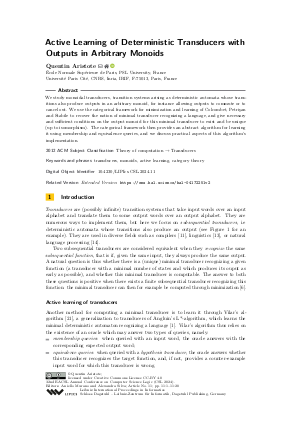Active Learning of Deterministic Transducers with Outputs in Arbitrary Monoids
Author
Quentin Aristote 
-
Part of:
Volume:
32nd EACSL Annual Conference on Computer Science Logic (CSL 2024)
Part of: Series: Leibniz International Proceedings in Informatics (LIPIcs)
Part of: Conference: Computer Science Logic (CSL) - License:
 Creative Commons Attribution 4.0 International license
Creative Commons Attribution 4.0 International license
- Publication Date: 2024-02-07
File

PDF
LIPIcs.CSL.2024.11.pdf
- Filesize: 0.89 MB
- 20 pages
Document Identifiers
Related Versions
- Extended Version https://ens.hal.science/hal-04172251v2
Subject Classification
ACM Subject Classification
- Theory of computation → Transducers
Keywords
- transducers
- monoids
- active learning
- category theory
Metrics
- Access Statistics
-
Total Accesses (updated on a weekly basis)
0PDF Downloads0Metadata Views
Abstract
We study monoidal transducers, transition systems arising as deterministic automata whose transitions also produce outputs in an arbitrary monoid, for instance allowing outputs to commute or to cancel out. We use the categorical framework for minimization and learning of Colcombet, Petrişan and Stabile to recover the notion of minimal transducer recognizing a language, and give necessary and sufficient conditions on the output monoid for this minimal transducer to exist and be unique (up to isomorphism). The categorical framework then provides an abstract algorithm for learning it using membership and equivalence queries, and we discuss practical aspects of this algorithm’s implementation.
Cite As Get BibTex
Quentin Aristote. Active Learning of Deterministic Transducers with Outputs in Arbitrary Monoids. In 32nd EACSL Annual Conference on Computer Science Logic (CSL 2024). Leibniz International Proceedings in Informatics (LIPIcs), Volume 288, pp. 11:1-11:20, Schloss Dagstuhl – Leibniz-Zentrum für Informatik (2024)
https://doi.org/10.4230/LIPIcs.CSL.2024.11
BibTex
@InProceedings{aristote:LIPIcs.CSL.2024.11,
author = {Aristote, Quentin},
title = {{Active Learning of Deterministic Transducers with Outputs in Arbitrary Monoids}},
booktitle = {32nd EACSL Annual Conference on Computer Science Logic (CSL 2024)},
pages = {11:1--11:20},
series = {Leibniz International Proceedings in Informatics (LIPIcs)},
ISBN = {978-3-95977-310-2},
ISSN = {1868-8969},
year = {2024},
volume = {288},
editor = {Murano, Aniello and Silva, Alexandra},
publisher = {Schloss Dagstuhl -- Leibniz-Zentrum f{\"u}r Informatik},
address = {Dagstuhl, Germany},
URL = {https://drops.dagstuhl.de/entities/document/10.4230/LIPIcs.CSL.2024.11},
URN = {urn:nbn:de:0030-drops-196545},
doi = {10.4230/LIPIcs.CSL.2024.11},
annote = {Keywords: transducers, monoids, active learning, category theory}
}
Author Details
References
- Dana Angluin. Learning regular sets from queries and counterexamples. Information and Computation, 75(2):87-106, November 1987. URL: https://doi.org/10.1016/0890-5401(87)90052-6.
- Quentin Aristote. Functorial approach to minimizing and learning deterministic transducers with outputs in arbitrary monoids, November 2023. URL: https://ens.hal.science/hal-04172251v2.
- Simone Barlocco, Clemens Kupke, and Jurriaan Rot. Coalgebra Learning via Duality. In Mikołaj Bojańczyk and Alex Simpson, editors, Foundations of Software Science and Computation Structures, Lecture Notes in Computer Science, pages 62-79, Cham, 2019. Springer International Publishing. URL: https://doi.org/10.1007/978-3-030-17127-8_4.
- F. Bergadano and S. Varricchio. Learning behaviors of automata from multiplicity and equivalence queries. In M. Bonuccelli, P. Crescenzi, and R. Petreschi, editors, Algorithms and Complexity, Lecture Notes in Computer Science, pages 54-62, Berlin, Heidelberg, 1994. Springer. URL: https://doi.org/10.1007/3-540-57811-0_6.
- Francesco Bergadano and Stefano Varricchio. Learning Behaviors of Automata from Multiplicity and Equivalence Queries. SIAM Journal on Computing, 25(6):1268-1280, December 1996. URL: https://doi.org/10.1137/S009753979326091X.
- Christian Choffrut. Minimizing subsequential transducers: A survey. Theoretical Computer Science, 292(1):131-143, January 2003. URL: https://doi.org/10.1016/S0304-3975(01)00219-5.
- Thomas Colcombet, Daniela Petrişan, and Riccardo Stabile. Learning automata and transducers: A categorical approach, October 2020. URL: https://doi.org/10.48550/arXiv.2010.13675.
- Thomas Colcombet, Daniela Petrişan, and Riccardo Stabile. Learning Automata and Transducers: A Categorical Approach. In Christel Baier and Jean Goubault-Larrecq, editors, 29th EACSL Annual Conference on Computer Science Logic (CSL 2021), volume 183 of Leibniz International Proceedings in Informatics (LIPIcs), pages 15:1-15:17, Dagstuhl, Germany, 2021. Schloss Dagstuhl - Leibniz-Zentrum für Informatik. URL: https://doi.org/10.4230/LIPIcs.CSL.2021.15.
- Robert Cori and Dominique Perrin. Automates et commutations partielles. RAIRO. Informatique théorique, 19(1):21-32, 1985. URL: https://doi.org/10.1051/ita/1985190100211.
- Jason Eisner. Simpler and more general minimization for weighted finite-state automata. In Proceedings of the 2003 Conference of the North American Chapter of the Association for Computational Linguistics on Human Language Technology - Volume 1, NAACL '03, pages 64-71, USA, May 2003. Association for Computational Linguistics. URL: https://doi.org/10.3115/1073445.1073454.
-
Charles N. Fischer, Ron K. Cytron, and Richard J. LeBlanc. Crafting a Compiler. Crafting a Compiler with C. Addison-Wesley, Boston, 2010.

- Stefan Gerdjikov. A General Class of Monoids Supporting Canonisation and Minimisation of (Sub)sequential Transducers. In Shmuel Tomi Klein, Carlos Martín-Vide, and Dana Shapira, editors, Language and Automata Theory and Applications, Lecture Notes in Computer Science, pages 143-155, Cham, 2018. Springer International Publishing. URL: https://doi.org/10.1007/978-3-319-77313-1_11.
- Ronald M. Kaplan and Martin Kay. Regular Models of Phonological Rule Systems. Computational Linguistics, 20(3):331-378, 1994. URL: https://aclanthology.org/J94-3001.
- Kevin Knight and Jonathan May. Applications of Weighted Automata in Natural Language Processing. In Manfred Droste, Werner Kuich, and Heiko Vogler, editors, Handbook of Weighted Automata, Monographs in Theoretical Computer Science. An EATCS Series, pages 571-596. Springer, Berlin, Heidelberg, 2009. URL: https://doi.org/10.1007/978-3-642-01492-5_14.
- Saunders Mac Lane. Categories for the Working Mathematician, volume 5 of Graduate Texts in Mathematics. Springer, New York, NY, 1978. URL: https://doi.org/10.1007/978-1-4757-4721-8.
- Daniela Petrişan and Thomas Colcombet. Automata Minimization: A Functorial Approach. Logical Methods in Computer Science, Volume 16, Issue 1, March 2020. URL: https://doi.org/10.23638/LMCS-16(1:32)2020.
- M. P. Schützenberger. On the definition of a family of automata. Information and Control, 4(2):245-270, September 1961. URL: https://doi.org/10.1016/S0019-9958(61)80020-X.
- Jenö Szigeti. On limits and colimits in the Kleisli category. Cahiers de topologie et géométrie différentielle, 24(4):381-391, 1983. URL: http://www.numdam.org/item/?id=CTGDC_1983__24_4_381_0.
- Henning Urbat and Lutz Schröder. Automata Learning: An Algebraic Approach. In Proceedings of the 35th Annual ACM/IEEE Symposium on Logic in Computer Science, LICS '20, pages 900-914, New York, NY, USA, July 2020. Association for Computing Machinery. URL: https://doi.org/10.1145/3373718.3394775.
- Gerco van Heerdt, Matteo Sammartino, and Alexandra Silva. Learning Automata with Side-Effects. In Daniela Petrişan and Jurriaan Rot, editors, Coalgebraic Methods in Computer Science, Lecture Notes in Computer Science, pages 68-89, Cham, 2020. Springer International Publishing. URL: https://doi.org/10.1007/978-3-030-57201-3_5.
- Juan Miguel Vilar. Query learning of subsequential transducers. In Laurent Miclet and Colin de la Higuera, editors, Grammatical Interference: Learning Syntax from Sentences, Lecture Notes in Computer Science, pages 72-83, Berlin, Heidelberg, 1996. Springer. URL: https://doi.org/10.1007/BFb0033343.
